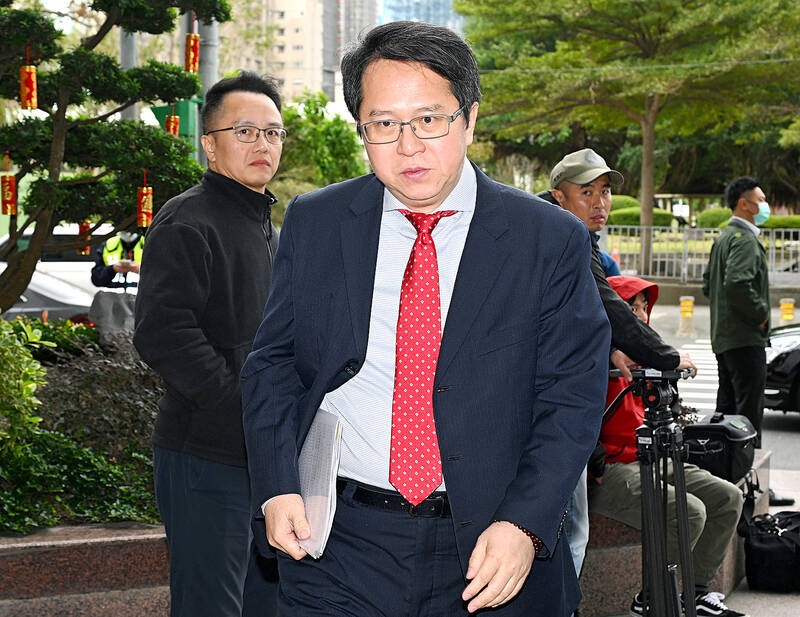A task force should be established in line with the three presidential committees formed last year to manage the Taiwan-US relationship, Democratic Progressive Party Legislator Chiu Chih-wei (邱志偉) said yesterday.
Although concerns have been raised over Taiwan-US ties given conflicting political causes, Washington does not seem to be changing its stance on China, he said.
However, the government should get rid of old mindsets, as policies such as “values diplomacy” or “democracy diplomacy” would no longer be enough to sustain ties with a White House led by US President Donald Trump, Chiu said, adding that Taiwan must demonstrate its indispensability to the US.

Photo: Liao Chen-huei, Taipei Times
The New York Times on Thursday cited US government insiders as saying that Taiwanese officials’ efforts to build bridges into Trump’s inner circle during trips to Washington have yielded little so far.
Chiu said the administration should set up a task force dedicated to communications with Washington, such as the “Mingteh Project,” or “Ming-teh-Gruppe,” though which Germany sent off-duty military officers to advise Chiang Kai-shek (蔣介石) in the 1960s.
Regular, normalized communications between the two governments must be established via a task force to build stable relations and promptly solve issues, he said.
The task force should include officials from the ministries of national security, national defense and finance, and diplomatic agencies, to promote prompt communication with the Trump administration, Chiu added.
While heads of state from major Asian countries, such as Japan and India, have visited the US since Trump returned to office, Taiwan’s president and vice president might not follow suit due to the nation’s tricky diplomatic situation, he said.
However, a special presidential envoy should be sent to visit the US as soon as possible, Chiu said, adding that someone with an industrial background and who is familiar with US politics would be the best choice.
Regular meetings between the government, industry and academia, and national affairs conferences on trade and economics should also be held to discuss difficult issues in the Taiwan-US relationship, as well the impact of tariff policies and industrial development on the semiconductor sector, he said.
In other news, Chinese Nationalist Party (KMT) Legislator Lee Yen-hsiu (李彥秀) said opposition parties would support the procurement of necessary arms, but special budgets would not be allocated without considering the national fiscal situation.
Lee made the comment in response to President William Lai’s (賴清德) call to raise defense spending to at least 3 percent of GDP.
Given that Trump during his campaign said he expected Taiwan to have a national defense budget of as high as 10 percent of GDP, Lai’s 3 percent proposal might be far off Trump’s goal, she said.
The government should also proactively ask the US government to complete delayed deliveries of anti-tank missiles, glide bombs and F-16 aircraft, Lee added.
KMT Legislator Hsu Yu-chen (許宇甄) said that a special budget of NT$160 billion (US$4.88 billion) must be drawn up this year to meet Lai’s goal.
Lai might get that budget from the NT$528.3 billion tax surplus, but people’s livelihoods should come before arms procurements, she added.
Meanwhile, Taiwan People’s Party caucus director Vicky Chen (陳智菡) said her party supports a balanced split of the military budget between personnel expenses, operational costs and military investments, with the aim of building modernized armed forces and achieving autonomous national defense.
Additional reporting by Su Yung-yao

POSITIVE DEVELOPMENT: Japan and the US are expected to hold in-depth discussions on Taiwan-related issues during the meeting next month, Japanese sources said The holding of a Japan-US leaders’ meeting ahead of US President Donald Trump’s visit to China is positive news for Taiwan, former Japan-Taiwan Exchange Association representative Hiroyasu Izumi said yesterday. After the Liberal Democratic Party’s landslide victory in Japan’s House of Representatives election, Japanese Prime Minister Sanae Takaichi is scheduled to visit the US next month, where she is to meet with Trump ahead of the US president’s planned visit to China from March 31 to April 2 for a meeting with Chinese President Xi Jinping (習近平). Japan and the US are expected to hold in-depth discussions on Taiwan-related issues during the

‘LIKE-MINDED PARTNER’: Tako van Popta said it would be inappropriate to delay signing the deal with Taiwan because of China, adding he would promote the issue Canadian senators have stressed Taiwan’s importance for international trade and expressed enthusiasm for ensuring the Taiwan-Canada trade cooperation framework agreement is implemented this year. Representative to Canada Harry Tseng (曾厚仁) in an interview with the Central News Agency (CNA) said he was increasingly uneasy about Ottawa’s delays in signing the agreement, especially as Ottawa has warmed toward Beijing. There are “no negotiations left. Not only [is it] initialed, we have three versions of the text ready: English, French and Mandarin,” Tseng said. “That tells you how close we are to the final signature.” Tseng said that he hoped Canadian Prime Minister Mark Carney

President William Lai (賴清德) yesterday bestowed one of Taiwan’s highest honors on Saint Vincent and the Grenadines (SVG) Ambassador Andrea Clare Bowman in recognition of her contributions to bilateral ties. “By conferring the Order of Brilliant Star with Grand Cordon on Ambassador Bowman today, I want to sincerely thank her, on behalf of the Taiwanese people, for her outstanding contribution to deepening diplomatic ties between Taiwan and SVG,” Lai said at a ceremony held at the Presidential Office in Taipei. He noted that Bowman became SVG’s first ambassador to Taiwan in 2019 and

A man walks past elementary school artworks at the Taipei Lantern Festival in Ximen District yesterday, the first day of the event. The festival is to run from 5pm to 10pm through March 15.